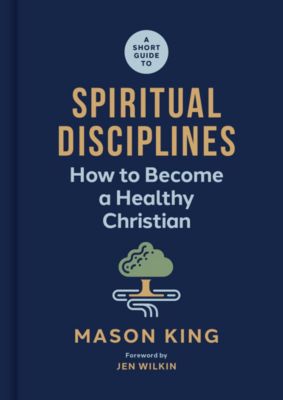
Spiritual disciplines give believers of any spiritual maturity the freedom to cultivate a flourishing life with God.
By Marissa Postell Sullivan
What comes to mind when you think of spiritual disciplines? For many, it’s a checklist of tasks Christians should be doing regularly—reading the Bible, praying, sharing the gospel. But what if believers began thinking of spiritual disciplines as freedom to cultivate a flourishing life with God?
In his book, A Short Guide to Spiritual Disciplines: How to Become a Healthy Christian, Mason King, a pastor at The Village Church in Flower Mound, Texas, helps believers do just that. Painting a holistic picture of what a full life with God can look like, King explores spiritual practices and dimensions of life that are widely applicable—for the new believer in a spiritual formation class and for the seasoned believer talking about spiritual growth among friends and community. Here’s a recent conversation with King about spiritual formation among pastors.
"What if believers began thinking of spiritual disciplines as freedom to cultivate a flourishing life with God?" — @MarissaPostell Click To TweetWhat changes for pastors when they begin focusing on who they might become rather than emphasizing what they must do?
Mason King: Fundamentally, your outlook on who God is and who He sees you as changes. The question is, “What happens when I move from a transactional relationship to a functional relationship—when I move from claiming grace in theory but not in practice to trying to live it out in practice and be shaped by what I say I believe?”
It’s easy to feel the tension of telling people we live in a grace-based relationship but functioning in a transactional way. It’s easier to distance yourself intellectually or even theologically from what you’re teaching. But then you’re not teaching out of a place of wholeness or even pursuing wholeness.
What are some challenges for pastors in shifting to a holistic perspective of applying spiritual disciplines?
Attention, emotions, and limits are three challenging buckets for us. In the pastoral role, we can focus so much on intellectual transformation—communicating ideas and trying to get people’s attention—that we overlook our emotional health and formation. And we can over-function because we feel a sense of burden or responsibility.
How is an understanding of a healthy life with God foundational for pastors’ spiritual formation?
If you asked different people from different traditions, “What is the Christian life?” or “What is the goal of the Christian life?” they would give different answers. And if you were to ask about who God is and how He’s revealed Himself, a large response would be subjective and experientially based. But we should be able to respond with, “This is who God tells me He is. God is who He is as He reveals Himself to me in the Scriptures and through the person and work of Jesus. If I want to know how God’s going to treat me, I need to look at Jesus.”
We come to God expecting Him to treat us like other people do or how we treat ourselves. But instead, we learn in the parable of the prodigal son that the Father is on the porch looking. He is loving and inviting us forward, not shaming us away.
"We come to God expecting Him to treat us like other people do or how we treat ourselves. But instead, we learn He is loving and inviting us forward, not shaming us away." — @masonking Click To TweetMy pastor says, “God is not looking for a future version of you love,” and my tagline with that is, “but He has a future version of you in mind.” It’s not just that you don’t need to fear that He’s waiting for you to get better. He has good for you, and you need to trust His heart.
In your book, you talk about three main dimensions of our lives: attention, emotions, and limits. What are these dimensions and how are they significant?
Attention is what you give yourself to. It’s what shapes and forms you. Paul tells us to be transformed by the renewing of our minds (Romans 12:2). This is our spiritual act of worship—to give our attention to God. Where we give our attention will form our loves, actions, and choices.
"This is our spiritual act of worship—to give our attention to God." — @MasonKing Click To TweetEmotions are how we interpret the world around us. Your feelings are real, but they’re not reliable. Your feelings are indicators of how your body is processing what’s going on around you. So, you need to have the maturity and ability to hold an emotion, look at it, and get curious rather than condemning yourself for what’s going on. You want to make forward movement through an emotion and figure out what to do with it. Trust that God is big enough for you to do that.
The final dimension is our limits. You are a created being. But everything we’re offered promises we can do more faster and overcome being created. We can push past our limits. It’s a move toward trying to do more than we should. I will die one day, but if I live in a world where I think I won’t die, I will miss the point of taking advantage of today. Living with the end in mind gives hope to our days.
Why is it important for pastors to think of spiritual practices as starting points for training in godliness, not checklists to accomplish?
When we pastor people and say, “This is a pragmatic approach. Put these habits in your life and you will change,” we miss conveying that disciplines exist to create space for us to pay attention to who God is and then be changed by looking at Him. Our loves are corrected; they are deepened and strengthened. And these habits become places where we meet and pay attention to the still, small voice of God in our lives.
What would you say to the pastor who wishes he was further along in his walk with Christ by now?
God is not surprised by where you are. And God is not shaming you for where you are. He will hold you accountable for where you are, and He is inviting you forward. You have a responsibility as a shepherd. Don’t neglect that. But also know God is inviting you forward just like He’s doing to other people. You need to know that the invitation to further joy and love is for anyone.
Be honest about your struggles. We’re all people. We’re all human. We’re all complex. We’re all messy. And it’s important to be able to say, “And so is the pastor.” When we disregard those truths, overfeed the mind, ignore the emotions, and live outside our limits, we put ourselves in real danger of tarnishing the name of Christ—of shipwrecking our own faith and the faith of others who follow us.
What is the church’s role in spiritual discipleship? How should pastors lead their churches in spiritual discipleship?
The life of a Christian is a life being formed to the image of Christ. The call is to become a person of wisdom. Our context will change, so we have to think through the tenants of wisdom we need to employ in our lives. The church wants to grow people in wisdom. It wants to develop people of virtuous, Spirit-driven character. We tend to try to make it easier by saying, “Do x, y, and z and then you’ll get this.” But life is not that clean-cut.
For permission to republish this article, contact Marissa Postell Sullivan.












